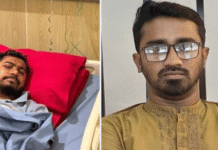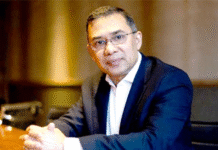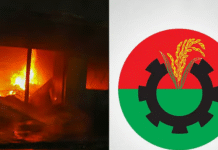 The designated war crimes investigator on Monday said Razakar, an auxiliary force of Pakistan army, was established during the 1971 Liberation War abolishing Ansar, a militia.
The designated war crimes investigator on Monday said Razakar, an auxiliary force of Pakistan army, was established during the 1971 Liberation War abolishing Ansar, a militia.
ASP Nurul Islam stated this while facing cross-examination by the defence counsel for war crimes accused Salauddin Quader Chowdhury before the International Crimes Tribunal-1.
He told the tribunal that Pakistan junta promulgated the Razakar Ordinance on August 2, 1971 abolishing the East Pakistan Ansar Act 1948.
The IO, also last prosecution witness (PW-41), said he had no knowledge about the specific date of the formation of Peace Committee (collaborator) in Chittagong. “But it was formed in April in 1971.”
Replying to a defence question, he said Pakistan army was a regular force, but it had played the role of occupied force during the Liberation War.
“Throughout my investigation, I didn’t look into the role of army during the Liberation War,” said ASP Nurul Islam, adding: “Even I didn’t investigate about their taking over of the Chittagong University.”
Asked whether the accused, Salauddin Quader Chowdhury, passed subsidiary examination in Philosophy and Sociology from the Dhaka University in 1970, he said, “I can’t say.”
Replying to a defence suggestion, the IO said: “It’s not true that
Salauddin Quader Chowdhury graduated in Political Science in October 1971 from Punjab University in West Pakistan after taking transfer certificate from the Dhaka University in April the same year.”
Replying to defence suggestions over the four listed prosecution witnesses’ statements recorded by the IO as their testimonies against Salauddin Quader Chowdhury without cross-examination by the tribunal under section 19 (2) of ICT Act 1973, Nurul Islam said: “It’s not true that he had prepared make-believe statements on behalf of the listed prosecution witnesses.”
The IO also denied another defence suggestion that he did not produce the PWs before the tribunal with mala fide intention.
On May 29, the tribunal accepted the recorded statement of one listed prosecution witness, now untraced, and those of all the three expired prosecution witnesses, as their evidence against the accused.
These four prosecution witnesses are Badal Biswas and late Janati Bala Pal, Jyotsna Bala Chowdhury and Badshah Miah.
The defence counsel could not comply with the tribunal’s verbal order to conclude the cross-examination by today (Monday) exhausting six days. Instead, at the second half, defence counsel Ahsanul Huq Hena prayed for further adjournment on health ground.
At this point, the tribunal sought opinion of the prosecution. Prosecutor Sultan Mahmud Simon backed the defence plea on humanitarian ground.
Considering the health ground of the defence counsel, the tribunal granted the adjournment plea with a reminder to close the cross-examination by tomorrow (Tuesday).
Source: UNB Connect









